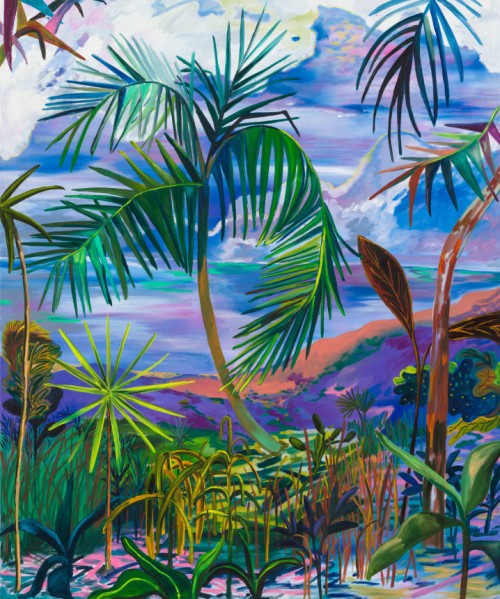
SHARA HUGHES Light the Dark
Hughes has become increasingly recognized as one of contemporary painting’s most vital and energizing voices. Her canvases, with their views of vivid landscapes and roiling natural scenes, are alive with colors, moods, and nuanced compositional transitions. They are visual experiences in which the felt dimension of life becomes palpable in the fullest way possible. Though Hughes makes no overt reference to her own biography, her work is deeply personal and suggests that all forms of life—including biological life and the shifting lives of art history—express emotion and desire.
In Light the Dark, Hughes looks to the coupling and uncoupling of day and night, of eros and pathos, and of joy and its brooding contrasts, as overarching metaphors for what it is like to feel, see, love, and live. The show is organized according to this basic distinction, with one of the galleries dedicated to “light” paintings, another to “dark” ones, and a third, transitional room to two large-scale works in a horizontal format that provide a bridge between the neighboring groupings. Connections between the galleries abound, both in terms of subject matter and visual atmosphere, so that light and dark function not so much as concepts or categories, but modes of inquiry engaged in urgent conversation. As a result, the paintings—and the show as a whole—feature both celebratory harmonies and heated conflicts.
For Hughes, painting provides a means of identifying and embracing the perpetual flow of contradiction at the heart of possibility. The Hangdog (2023) is one of several canvases to exemplify this guiding ethos in her work. A large flower dominates the foreground of a lush moonlit scene, its head seemingly bent in prayer or resignation. Clearly an ode to the moods and yearnings that pervade the night, the painting nonetheless makes space for—and is even contained by—the clarity and power of the sun. The view is framed, for instance, by fragments of the trunks and branches of two golden trees, their luminosity lending both structure and daytime-inflected buoyancy to an otherwise nocturnal garden of melancholic delights. The crisp fidelity of the smaller plants and flowers that fill the lower half of the composition, as well as the fluttering leaves that appear to reflect the moon, suggest that the explicit forthrightness of the sun is never completely absent from night’s cloistered equations.
In Come Away With Me (2023), another vertically oriented painting, Hughes’s varied brushwork is on display, as is her ability to allow her images to unfold like the stages of a journey. The mottled path that leads through a receding stand of trees leads the eye toward the horizon, where the tight, striated networks of marks that make up branches, leaves, needles, and grasses give way to open areas of impressionistically applied color. If each tree stands out like a character, so too does each kind of mark and each dab of paint: wispy red branches crossing over and under each other like arteries racing toward the heart, or the iridescent flecks filling the central path like jewels, all of which contribute to the sense of pursuit that distinguishes both how and what Hughes paints. By allowing herself to relax control over her own process—and by permitting herself to make mistakes and then respond to them in novel ways—the artist breathes her work full of an openness that, in turn, invites viewers to completely orient themselves toward the paintings.
Such openness also defines the way in which Hughes evokes an immersive sense of scale, with the majority of the paintings in Light the Dark tall or wide enough to feel like their scenes can be physically entered. In one of many examples found in the exhibition, Swelling (2023), an expansive diptych in which endless rows of waves press urgently against the edges of the canvases, demonstrates the command with which she activates the entirety of her compositions. For Hughes, however, operating at large scale also means trusting painting to communicate the irreducibly dynamic totality of the human experience, with its inspiring, disturbing, and mystifying aspects presented honestly and free from artifice. The landscapes in this show find Hughes finding herself—and her viewers—in the uncertain spaces where light and dark create, overcome, and recreate each other on a moment-to-moment basis.
Shara Hughes is the subject of a solo exhibition at Kunsten Museum of Modern Art Aalborg, Denmark, on view through September 17, 2023. She has been the subject of solo exhibitions at The FLAG Art Foundation, New York (2022); Kunstmuseum Luzern, Switzerland (2022); Yuz Museum, Shanghai (2021–2022); Contemporary Art Museum St. Louis (2021); Garden Museum, London (2021); Aspen Museum of Art, Colorado (2021); and Le Consortium, Dijon, France (2021). Recent group exhibitions include Open Ended: SFMOMA’s Collection, 1900 to Now, San Francisco Museum of Modern Art (ongoing); Being in the World: The Tenth Anniversary of the Long Museum, Long Museum, Shanghai (2023); Nature humaine – Humaine nature, Fondation Vincent van Gogh Arles, France (2022–2023); America Will BE! Surveying the Contemporary Landscape, Dallas Museum of Art (2019); and Whitney Biennial 2017, Whitney Museum of American Art, New York. Her work is in the permanent collections of institutions including The Metropolitan Museum of Art, New York; Denver Art Museum; High Museum of Art, Atlanta; and Smithsonian American Art Museum, Washington, D.C., among others. Hughes lives and works in Brooklyn, New York.